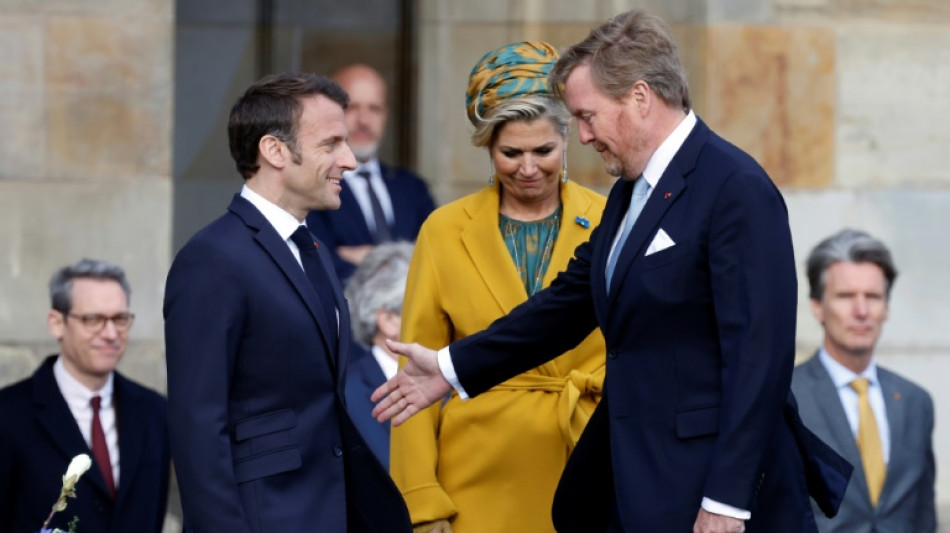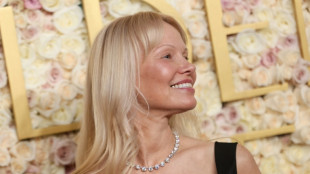
| NGG | -3.3% | 56.13 | $ | |
| RBGPF | 100% | 60.49 | $ | |
| SCS | -3.01% | 10.97 | $ | |
| RYCEF | -0.42% | 7.07 | $ | |
| RIO | 0.36% | 58.84 | $ | |
| VOD | -1.99% | 8.05 | $ | |
| GSK | -1.99% | 33.09 | $ | |
| CMSC | -0.79% | 22.92 | $ | |
| BTI | -2.34% | 35.9 | $ | |
| BP | 0.54% | 31.29 | $ | |
| BCC | -1.31% | 115.88 | $ | |
| RELX | -0.86% | 46.37 | $ | |
| BCE | -2.92% | 22.96 | $ | |
| AZN | 0.64% | 67.01 | $ | |
| JRI | -1.16% | 12.08 | $ | |
| CMSD | -0.65% | 23.25 | $ |

Macron faces China row as Dutch state visit starts
French President Emmanuel Macron began a state visit to the Netherlands on Tuesday due to feature a keenly watched speech on Europe as he battled a furore over his controversial remarks on Europe and China.
Macron's speech on European sovereignty comes after the 45-year-old French leader said in an interview that Europe must not be a "follower" of either Washington or Beijing on Taiwan.
Making the first state visit by a French president to the Netherlands for 23 years, Macron and his wife Brigitte were greeted by Dutch King Willem-Alexander and Queen Maxima on their arrival in Amsterdam.
The French leader stood to attention alongside them outside the Royal Palace as a band played the Marseillaise, the French national anthem. He later laid a wreath at the Dutch National Monument.
A few people cheered as Macron's car arrived, an AFP journalist said, in a contrast to the recent scenes of anger in France over Macron's pension reforms.
But amid the pomp and ceremony, all eyes are on Macron's comments on China, which he visited last week.
The Elysee Palace insisted Tuesday that the president had never called for Europe to keep an "equidistance" from the United States and China.
"The United States are our allies, we share common values," the French presidency said.
Macron is due to make a speech in English on "European sovereignty" in security and economic matters on Tuesday afternoon at the Dutch Nexus institute in The Hague.
He will use the address to present "a doctrine of economic security" against China and the United States, amid European unease over US climate subsidies.
The speech comes after Macron said in an interview with media including French business daily Les Echos and Politico that "we don't want to depend on others on critical issues", citing energy, artificial intelligence and social networks.
- 'Brain death' -
Macron's comments in the same interview on Taiwan -- that Europe risks entanglement in "crises that aren't ours" and should "depend less on the Americans" in matters of defence -- have raised questions, like his past remarks on Ukraine.
"The worst thing would be to think that we Europeans must be followers and adapt ourselves to the American rhythm and a Chinese overreaction," Macron said after his three-day state visit to Beijing.
His comments raised eyebrows on both sides of the Atlantic.
Poland's Prime Minister Mateusz Morawiecki said the alliance with the United States was an "absolute foundation" of European security.
"Some Western leaders dream of cooperation with everyone, with Russia and with some powers in the Far East," he added, without naming those leaders.
US Senator Marco Rubio said on Twitter that "we need to find out if Emmanuel Macron speaks for Europe".
"A brain death has occurred somewhere, no doubt," said the director of the Polish Institute of International Relations (PISM), Slawomir Debski, referring to the words used by the French president to describe NATO in 2019.
But the White House said Monday it was "confident" in the relationship with France despite Macron's comments.
During the two-day Dutch state visit, Macron will have a state dinner with the king and queen, see the hot-ticket Johannes Vermeer exhibition at the Rijksmuseum in Amsterdam and meet Prime Minister Mark Rutte on a canal boat.
The visit is meant to highlight a new dynamic between Paris and The Hague after the turning point of Brexit.
In the wake of the speech, France and the Netherlands will sign a "pact for innovation" on Wednesday focusing on cooperation in semiconductors, quantum physics and energy.
The French president's domestic political troubles also threaten to intrude on the visit, with a new day of strikes against his pension reform plans scheduled for Thursday.
S.Esposito--LDdC



